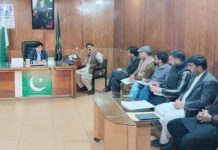ISLAMABAD, FEB 29 (DNA) : Head of the prime minister’s ‘Digital Pakistan’ initiative, Tania Aidrus, in a panel discussion on Friday, shared that the response to the initiative was overwhelmingly good and it felt like a movement was already in place.
“A lot is happening in the digital arena but it’s important to keep the end view in sight and take a strategic approach. Efforts at provincial and federal levels have to be synchronised to achieve the objectives on a broader scale,” she said.
Aidrus was speaking a panel discussion on Pakistan’s digital future held at Islamabad’s Serena Hotel, which included prominent players in the local digital industry.
The event titled ‘Reimagine our Digital Future – Preparing to thrive or survive?’ was held as part of Raabta, Serena Hotel’s public diplomacy initiative, meant to create awareness among diverse groups and networks on critical aspects of socially significant fields such as the economy, health and education.
The panelists discussed the challenges facing the local digital economy in face of its rapid expansion, and the challenges and opportunities this brings in terms of innovation, governance, job market, cyber risks, regulation and ease of doing business.
Aidrus, who was also the keynote speaker at the event, spoke about the five pillars that form the cornerstone of the government’s digital policy, which include access and connectivity, digital infrastructure, e-government and digital skilling.
The official said that the internet was a democratising force and digital technologies allowed equitable access to knowledge, provided the affordability of digital infrastructure was enabled and commodities like the internet were not taxed as a luxury item.
Tania Aidrus compared 35% internet penetration in Pakistan with 80% in other developing countries like Myanmar, and said Pakistani policymakers needed to ensure that smartphones and internet are more affordable and accessible, especially in rural areas.
Meanwhile, Raabta curator Sidra Iqbal said the focus of the event was on the potential benefits and costs arising from global digital technology changes, and, importantly, anticipation of public policy solutions to emerging problems that would shape the future of society and the economy for generations to come.
“Change can come within a generation if managed properly, rather than waiting for millennia. We are asking if the policymakers going to be reactive to the digital revolution or take the bull by the horn and prepare an environment for the digital economy to thrive,” she said.
















